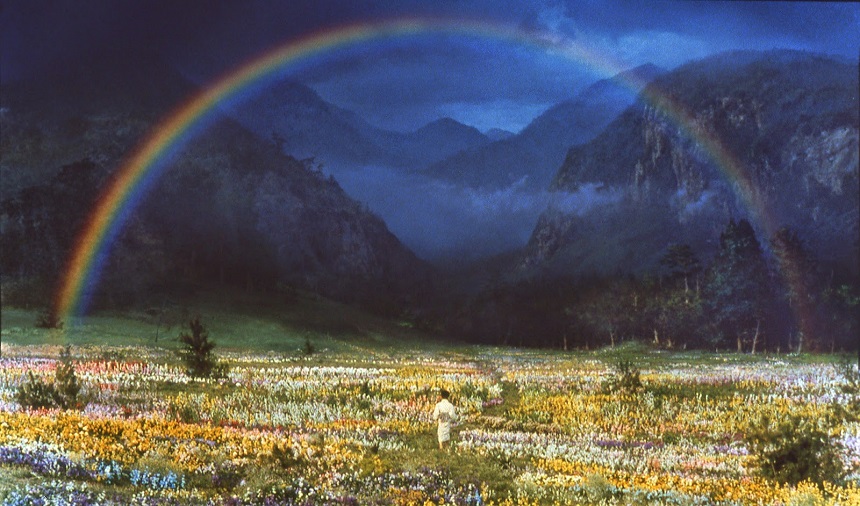Blu-ray Review: Jump Straight Into Akira Kurosawa's DREAMS

Late-career Kurosawa is an odd animal. There's a wealth of critical writing around how the master filmmaker, following his suicide attempt in 1971, became noticeably didactic in his work. Derzu Uzala is a hell of a thing to look at, but leans on a one dimensional mythology of the noble naturalist and the excesses of technological modernity. Ran is apocalyptically beautiful, but its pessimistic moralizing overtakes its nuance.
And then there's Dreams, which is certainly the oddest single flourish in a career much more grounded in traditional narrative. An anthology film of eight shorts, each purportedly inspired by one of Akira Kurosawa's eponymous dreams, the film is visually unparalleled in his canon and oftentimes so surreal that it's better experienced with consciousness-expanding substances. (Lest we forget, this is the one where Martin Scorsese makes a brief cameo as a fast-talking Vincent Van Gogh.)
One of the means by which one can approach Dreams is, in fact, by way of that cameo, and also a title card close to the beginning of the film: "Presented by Steven Spielberg / Amblin Entertainment." Kurosawa's films of the 1980s and 1990s were, in part, built around a re-legitimization of the filmmaker's credibility, thanks to a huge debt of gratitude being paid by the filmmakers of the West. The "movie brats" were at the height of their powers, and were quick to claim Kurosawa as a key figure in their canon of inspiration.
George Lucas and Francis Coppola helped get Kagemusha off the ground, and Spielberg and Scorsese are paying homage here. (Lucas also secured the film's visual effects through ILM, at cost.) That kind of support empowered Kurosawa to make what is essentially an experimental film with Dreams, and to indulge his pure visual id without concerning himself overmuch with the finer points of storytelling. There are upsides and downsides to this.
Another way to approach Dreams is to recall that whenever Kurosawa couldn't get films made in the 1970s and early '80s, he would spend his time painting his imagined visuals, in elaborate renderings that would later serve as a kind of "concept art" for Kagemusha, Ran, and Dreams. The latter, particularly, bears all the hallmarks of a project that started its life as a series of oil paintings.
There is a heightened awareness of colour and composition, and if there's a single reason to add Dreams to your personal Criterion Collection, this is it. The Blu-ray presentation of the new 4K transfer of Dreams is sublime, and leaps off the screen in vivid, attention-grabbing images. My advice: throw a fancy cocktail party and have Dreams playing on every screen in the house.
All of this makes Dreams sound like hard work. It's really not; it just requires its audience to abandon the primacy of storytelling from its expectations and look instead at how the film explores theme, mood, and particularly anxiety through visualization and sound. (It wouldn't hurt to brush up on your Noh theatre, too.) The vignettes seem dreamlike in the best possible way, not just in the dream logic of characters' behaviour and responses, but in the way they seem to articulate nested fears and desires through unexpected associations.
There's a lot to work with here, and for a work from a filmmaker nearing the end of his life the effect is particularly poignant. Dreams looks back at Kurosawa's childhood and young adulthood through a lens of art and the subconscious, and affirms Kurosawa's late period as a fruitful, challenging body of work.
Dreams finally joins the Criterion Collection at spine #842, and the special features on the disc are nearly worth the sticker price all on their own. The commentary track is by Stephen Prince, author of The Warrior's Camera, one of a triptych of essential works about the director. (Look up Cowie and Richie for the other two.) The essay in the accompanying booklet, by Village Voice film critic Bilge Elibri, is also outstanding, contextualizing the contemporary response to Dreams against how we might view it now.
Even more delightful, the booklet also contains Kurosawa's script for the unproduced 9th dream sequence in the film. Aside from being a fun read, it's also neat to see that Kurosawa wrote this screenplay in the first person, exactly as though he was describing his dreams.
In the supplemental section of the disc itself, we have Kurosawa's Way, a 52-minute documentary interviewing a series of filmmakers about the influence Kurosawa had on their work. Miyazaki is in there, as is Kiarostami; and it's fun to hear John Woo dissect how Kurosawa works with the camera, or Clint Eastwood recount his early encounters with the filmmakers' work, and how that led to A Fistful of Dollars. There are also interviews with Kurosawa's script supervisor and assistant director, who have long-view insights into the director's work.
And then there's Making of Dreams by House director Nobuhiko Obayashi. At 150 minutes, it's a half-hour longer than the film whose production it is chronicling. It's also almost entirely formless, choosing to be a fly on the wall of the production (a fly with a Video Toaster, apparently), rather than giving the specific artistic and cinematic choices their own shape. This is great if you want to, for example, watch production assistants pour blue dye into a river to achieve the neon-blue waters on the shore of the Van Gogh sequence; less so if you are interested in how or why the team approached the problem in the first place.
I suppose the answer's always the same in any case: Kurosawa dreamed it, and the production dutifully made it so.







